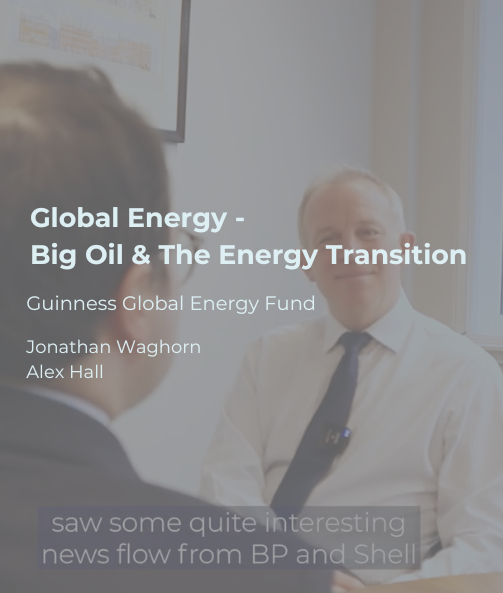Alex HallJonathan, large cap integrated oil and gas companies have historically shown a willingness to adapt to previous energy transitions. What routes can they take for this upcoming energy transition?
Jonathan WaghornSure, there's probably five kind of key areas that we would see them looking at for their opportunities.
- First of all, think about growth of low carbon electricity likely to be a combination of renewable power in the areas of wind, solar, onshore and offshore wind incidentally. But then also trading around that and access to retail around that as well.
- Petro Chemicals continues to play a big role and that's an interesting one from a net zero point of view because it is a route for using hydrocarbons that is non combustion. So it doesn't emit carbon.
- A clear focus on biofuels, and that's a combination both of natural gas and renewable natural gas, but also renewable liquids like renewable diesel as an example. So predominantly in the power markets for gas and in transportation for liquids.
- Carbon sequestration would be area number four and likely I think that’s an activity still today that is somewhat uneconomic we'll get some better kind of economies of scale as that continues to grow through.
- And then the 5th area would be green hydrogen and clean hydrogen they’re coming from renewable power still remains at the high end of the cost curve, but again that's an area where with investment we would imagine those economics will gradually improve.
Alex HallBrilliant. Thank you.
Late last year, we saw some quite interesting news flow from BP and Shell rolling back, pushing back at least, some of their climate pledges. What do you make of these?
Jonathan WaghornI think they've reacted to the environment, so if you think of what's happened, especially in the last 12 or 24 months, has been the growth in the topic of energy security. Especially around things like the Russian invasion of Ukraine and countries wanting to have access to their own secure supply of energy, predominantly fossil fuels. So that's government led, it's also company led as well. We see that in company announcements. That's led to higher fossil fuel prices, higher fossil fuel prices mean better economics for fossil fuel activities and these companies at the end of the day are efficient allocators of capital looking to position themselves in a pragmatic way for the long term and they've been through energy transitions before, so essentially here, tilting towards where the economics are best where policy is supportive to make the best risk adjusted returns for the future. So I don't think it's anything beyond just a pragmatic kind of rebalancing towards good returns.
Alex HallBrilliant. Thank you.
We also saw late last year an announcement from Exxon that they're about to start the process of lithium mining involving drilling kilometres underground to access salty brine. What do you make of these moves and can you put those in perspective, especially compared to the other US Super major, Chevron?
Jonathan WaghornSure. I guess Exxon has been slow in positioning itself relative to its peers in non-fossil fuel activities. It's recently done deals buying into the Permian as an example, so buying oil production with Pioneer Natural Resources. But recently, yes, they're talking about developing an area of Alberta brines, Arkansas brines estimated to be some pretty reasonable size actually they could be, if developed about 10% of the current lithium market, starting maybe 2027 and Exxon say that that could be supporting development of about a million electric vehicles alone, just from what they're planning.
It's not just them. There are other companies also talking about the same thing, and they're all, reacting to the fact that lithium is a very fast growing market, it’s growing from a very small base. I mean to put it into context, lithium from a revenue point of view is still only 1% of the size of the oil market. So this is a market really that is still to be developed. The process they're considering is called direct lithium extraction, DLE, and it's a process that uses a membrane ultimately to remove lithium from salt water, where lithium is at a very low level of concentration, potentially much cheaper than existing technologies But it's still very early days. The other routes being evaporation and hard rock mining so small for Exxon, small currently in the lithium market, but certainly one to keep an eye on, with such a significant company getting involved.
Beyond lithium, then Exxon’s pursuing opportunities in hydrogen, it's looking at biofuels. It's looking carbon capture and storage, and they've suggested about 10% of their CapEx will be going on reducing emissions at their existing facilities and supporting their 2030 greenhouse gas emissions targets. So early days. But interesting to see such a big company with such a good history, getting involved here in a technology that still is somewhat, unproven.
Alex HallOK, very interesting.
And that number you cite, the figure you cite, a million batteries for a million EVs from 2027. Is, that a large part of the EV market that you predict at that point? How big will the EV market by your calculations be at that point?
Jonathan WaghornSure. So EV's today about 16 million electric vehicles. We would expect to be sold in the world this year. As that continues to grow, we'll go from sort of at about a 20% market share this year to about a 50% market share at the end of this decade, 2030 and then 100% market share come 2040, all driven by the economics of batteries improving and getting down to $100 per kWh, so 1,000,000 EV's today, 1/16 of the market. By the time we get to 2027, it's going to be, you know, a 1/25, it's going to be 2% or 3% of the market. That kind of scale if Exxon gets there.
Alex HallStill meaningful nonetheless.
Jonathan, given them the scale of big oil generating 10s of billions of dollars in free cash flow every year. Will their moves towards the energy transition moving from hydrocarbons towards electricity as well as some of the other areas you've already cited reward shareholders in the medium and potentially longer term despite current markets scepticism?
Jonathan WaghornSure. So yes, we would imagine so, but it probably will take some time. So the Supermajors historically, have been good allocators of capital. The energy transition brings a broader suite of opportunities for them to allocate their capital, and we do believe the pockets that they are looking at do offer potentially good returns, but the market remains very sceptical because these are new areas and we just don't know. But I would believe that the companies themselves understand the landscape pretty well.
For all the interest around the big oils and the potential transition to renewables, it it's still going to be, a long journey. To put that into some context, if you think of the Supermajors, I think of Total is probably the leader in terms of kind of moving towards low carbon, even then we think by 2030 only around a quarter of their enterprise value will come from their low carbon activities and the low carbon business within the Europeans. As a group, some of the smaller names are further developed. Repsol as an example, today about 20% of its EV, we think coming from low carbon businesses and we do think the market gives very low credit to those activities at the current time.
Alex HallOK, very interesting, thank you.
Jonathan, you touched on in that point the difference in speed movement within transitioning away from hydrocarbons to renewables between US and European counterparts, do you feel given the market valuation premium given to US names currently that they're being rewarded for being slower to transition?
Jonathan WaghornPotentially there's some of that. So if we look historically, the US Supermajors have typically traded at about a 30% multiple premium to the Europeans today, depending on your multiple, it's probably something in the order of 50% to 100% so there is a there is a difference, they do look relatively more expensive than usual. I think clearly the long term outlook is a factor in there. There's also the domicile. So the fact that these are European companies, we'd argue the regulation especially around things like carbon is more of a negative and the valuation for the Europeans versus the US. And I'd argue that ESG lens of European investors as well, probably explain some of the differential. So we see the Europeans sitting here trading with free cash flow yields in excess of 10%. Now they're very high in historic terms that implies limited terminal value is being applied. To these companies in terms of their longer term transition activities. So we would argue it's a case of the Europeans moving up those free cash flow yields, normalising over time. Ultimately, we'd say that they will succeed and they deserve a terminal value for their future cash flow streams, and we would expect that differential then versus the US names to close up over time.
Alex HallBrilliant. Thank you.


